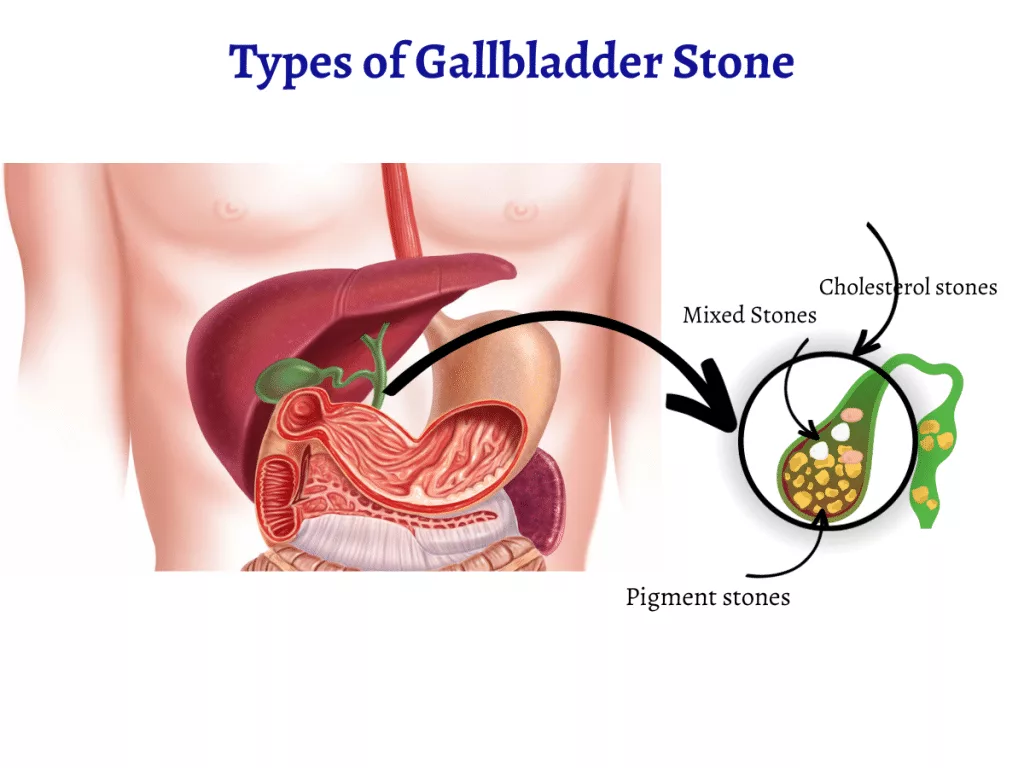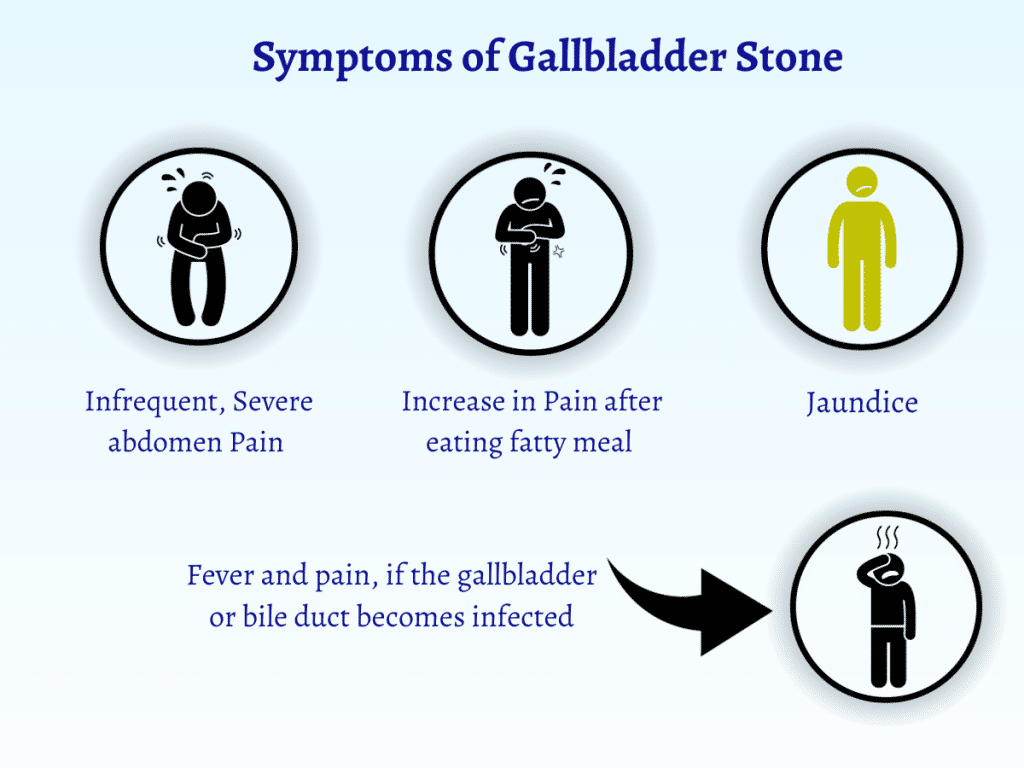November 18, 2023
Introduction:
Gallbladder stones, also known as gallstones, are solid particles that form within the gallbladder, a small organ located beneath the liver. These stones can vary in size, ranging from tiny grains to larger, more significant structures. Gallstones can lead to discomfort and potentially serious complications if left untreated. To understand the reasons behind gallstone formation, and when to seek help of a Laparoscopic gallbladder stone surgeon in Mumbai.
Let’s delve into the various causes and contributing factors:

Cholesterol Imbalance: The most common type of gallstones, known as cholesterol stones, are primarily composed of cholesterol. When there is an imbalance in the cholesterol levels and bile salts in the gallbladder, excess cholesterol can crystallize, forming stones.
Bile Composition: Bile, produced by the liver, plays a crucial role in the digestion and absorption of fats. Changes in the composition of bile, such as an increased concentration of cholesterol or bilirubin, can promote gallstone formation.
Bilirubin Excess: Bilirubin is a yellow pigment produced during the breakdown of red blood cells. When the liver excretes an excessive amount of bilirubin into the bile, it can lead to the formation of pigment stones, also known as bilirubin stones.
Gallbladder Stasis: When the gallbladder fails to empty properly or completely, bile may become stagnant, increasing the likelihood of stone formation. Prolonged gallbladder stasis can contribute to the precipitation of cholesterol and bilirubin, leading to stone development.
Obesity and Rapid Weight Loss: Obesity is a risk factor for gallstone formation. Additionally, rapid and significant weight loss, such as through crash diets or bariatric surgery, can increase the concentration of cholesterol in bile and promote stone development.
Genetic Predisposition: A family history of gallstones can increase an individual’s susceptibility to developing them. Certain genetic factors may influence how the body metabolizes cholesterol and bile, affecting gallstone formation.
Age and Gender: Gallstones are more prevalent in individuals over the age of 40, and women, especially those who have experienced multiple pregnancies, are more susceptible to gallstone development.
Medications and Hormonal Influences: Some medications, such as cholesterol-lowering drugs, and hormonal influences, such as estrogen-based contraceptives or hormone replacement therapy, can influence bile composition and contribute to gallstone formation.
Certain Medical Conditions: Certain medical conditions, such as diabetes, cirrhosis of the liver, and inflammatory bowel disease (IBD), can increase the risk of gallstone formation.
Ethnicity: When it comes to gallbladder stone formation, it’s essential to consider how different factors, including ethnicity, can influence an individual’s risk. While gallstones can affect people of various backgrounds, it is pertinent to understand that certain ethnicities in India may have a higher prevalence of gallbladder stones compared to others.
Research has indicated that some ethnic groups in India, such as certain communities within the Indian population, might have a higher susceptibility to gallstone development. While the reasons for this association may involve genetic predispositions and lifestyle factors, it’s vital to emphasize that gallbladder stones can affect anyone, regardless of their ethnic background.
As part of the Mumbai or Indian population, it’s crucial to stay informed about the risk factors associated with gallstones and the measures that can be taken to maintain good digestive health. Adopting a balanced diet, managing weight, staying physically active, and seeking timely medical attention if symptoms arise are universal steps that can benefit everyone in preventing and managing gallbladder stones.
Limit Processed Food and Fast Foods:
Gallbladder removal surgery, also known as cholecystectomy, brings relief to individuals suffering from gallstones and related issues. However, after the surgery, certain dietary modifications become necessary for maintaining optimal digestive health throughout life. Here’s a comprehensive guide on the lifelong care and dietary adjustments after gallbladder removal:
Adopting a low-fat diet is essential, particularly in the initial post-surgery period. Focus on consuming foods that are easier on the digestive system and lower in fats. Gradually reintroduce healthy fats in moderation, as your body adapts to the changes.
Instead of consuming large meals, opt for smaller and more frequent meals throughout the day. This eating pattern helps your digestive system manage food efficiently and prevents overwhelming your system with a heavy meal.
Pay attention to your body’s response to different foods. Identify and avoid trigger foods that might cause discomfort or digestive issues. Common culprits include spicy, greasy, and heavily processed foods.
Staying well-hydrated is crucial for healthy digestion. Drink plenty of water throughout the day to keep your digestive system functioning optimally.
After the surgery, begin incorporating fiber-rich foods into your diet slowly. Gradual increments will help your system adjust and prevent potential digestive discomfort.
Some foods can cause excess gas, leading to discomfort. Limit or Avoid intake of gas-producing foods like processes foods, instant packaged foods, and carbonated beverages.
Choose lean sources of protein, such as poultry, tofu, and legumes, to reduce the strain on your digestive system while providing essential nutrients.
Consider including probiotic-rich foods like yogurt or curd in your diet. Probiotics can help maintain a healthy balance of gut bacteria, promoting digestion.
Keeping a food diary can be beneficial in identifying any specific foods that may trigger digestive issues. Note down what you eat and any accompanying symptoms to pinpoint potential problem foods.
Stay connected with your healthcare provider for regular check-ups and follow-ups. This ensures your recovery progress is monitored, and any concerns are addressed promptly.
Conclusion:
Gallbladder removal surgery offers relief from gallstone-related problems, but it necessitates lifelong care and dietary modifications. Embracing a low-fat diet, eating smaller, frequent meals, and identifying trigger foods are crucial for maintaining optimal digestive health. Gradually incorporating fibre, staying hydrated, and considering probiotics contribute to a well-functioning digestive system. Always consult your healthcare provider for personalized advice and guidance on your specific dietary needs after gallbladder removal surgery. By following these guidelines, individuals in Mumbai can enjoy a healthier and more comfortable life after gallbladder removal.

If any one of You and Your near ones facing the above symptoms of Gallbladder, Reach Out to Maestro Laparoscopic Surgeon in Mumbai – Dr. Pradeep Shriyan.
Developed by PRAZONE Web Solutions
Copyright © 2024 All rights reserved by
Dr Pradeep Shriyan